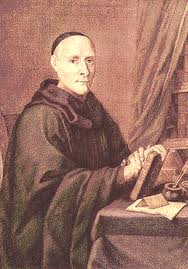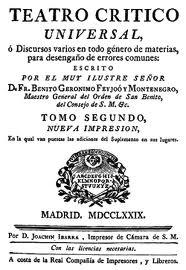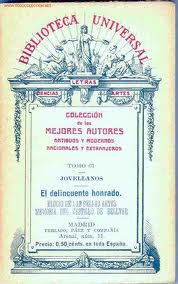Enlightenment prose: Fray Benito Jerónimo Feijoo & Gaspar Melchor de Jovellanos
During the Enlightenment, hardly any of the works in prose were narrative works. The most used form in Spanish enlightenment prose was the essay, often with an educational purpose. Newspapers, which were quite a recent innovation, were used to spread the Enlightenment ideas through the masses, and also to divulge the works of some French and European philosophers, whose ideas were being adapted in Spain. There are several important writers of prose during the Spanish Enlightenment, but the most important ones were Fray Benito Jerónimo Feijoo and Gaspar Melchor de Jovellanos.
Fray Benito Jerónimo Feijoo - Life and Works

Benito Jerónimo Feijoo was born in 1676 in Orense (Galicia), in the midst of a noble family. In 1690 he entered the Benedictine Order. He studied in Salamanca and won a Theology professorship in the University of Oviedo, where he lived from 1709 until his death in 1764.
Feijoo is considered one of the best writers of the Spanish enlightenment prose, and also the first essayist in Spanish literature. Although he was formed under the Aristotelian ideals, Feijoo had a very open mind, and some of his essays were found to be so polemic that even Ferdinand VI had to defend him, naming him honorary advisor.

Fray Benito Jerónimo Feijoo expressed his knowledge in many essays that he grouped in the 8 volumes of the "Teatro Crítico Universal" (1726-1739) and in the 5 volumes of "Cartas eruditas y curiosas" (1742-1760). Feijoo thought it was necessary for knowledge to be available in written form so Spain could modernize itself, like the rest of Europe had done. Thus, his works have an educational tone, very catholic, but with the aim of spreading the ideals among the higher classes. He was very critical of superstitions and false miracles.
Feijoo played an important role in the consolidation of Spanish as a language and defended it's use against Latin, which was still used in Universities. His works treat many different topics: economics, politics, astronomy, mathematics, physics, history, religion... His style was far from the Baroque, very simple and natural, and especially very clear so anyone could understand his essays.
Gaspar Melchor de Jovellanos - Life and Works
Gaspar Melchor de Jovellanos was born in Gijón in 1744 in a noble family without fortune. He studied Law and then was sent to Seville were he contacted the Salamanca school of poetry. In Madrid he was major of House and Court, and he became more involved in politics. He was exiled and after that named Grace and Justice Minister and later Minister of State by Godoy. Once he lost the trust of the Minister, he was captured in the Bellver Castle in Mallorca until the riot of Aranjuez threw Godoy from power and gave Jovellanos his freedom back. In 1808 he was part of the board against the Napoleonic troops, and for that he was prosecuted by the French. He tried to escape to Cadiz but the difficult weather conditions forced him to hide in the port of Vega de Navia, where he died from pneumonia. It was 1811.

Jovellanos is considered one of the best Spanish enlightenment prose writers. He cultivated several literary genres, like poetry and theatre, but his best works are in the form of essays, and wrote about politics, agriculture, philosophy, customs... always from the point of view of Enlightened Despotism. One of his better considered essays was the one he wrote on the agrarian law, written in 1784 but published in 1795, were he proposed the elimination of obstacles to the free enterprise and an educational reform. If these ideas were accepted, they would be the base for the industrialization of the country.
During his time in Seville he was one of the participants in the gatherings organized by Pablo Olavide, which drove him to write some love poetry and the first version of the tragedy "El Pelayo" (1769) (the only tragedy he ever wrote) and the comedy "El Delincuente Honrado" (1773).
Jovellanos also worked hard to better the life conditions of his home town, Gijón. He promoted the construction of the Gijón-León road, which he never saw finished but which caused the transfer of maritime trade from the port of Asturias in Avilés to Gijón.

